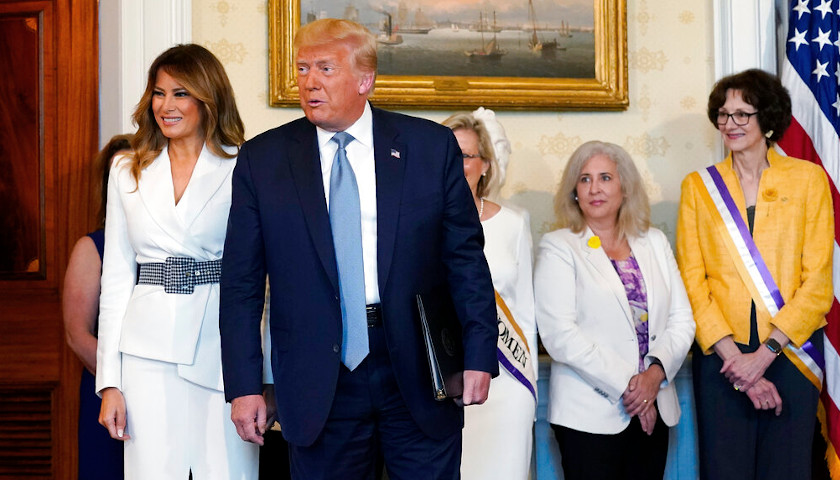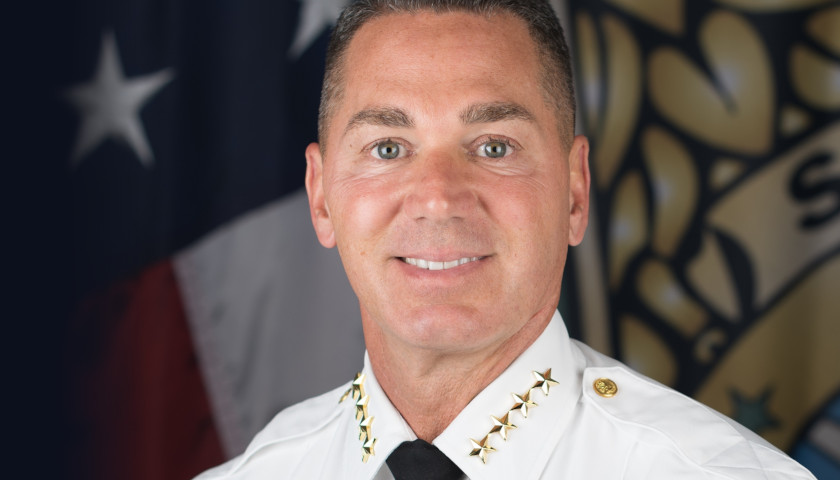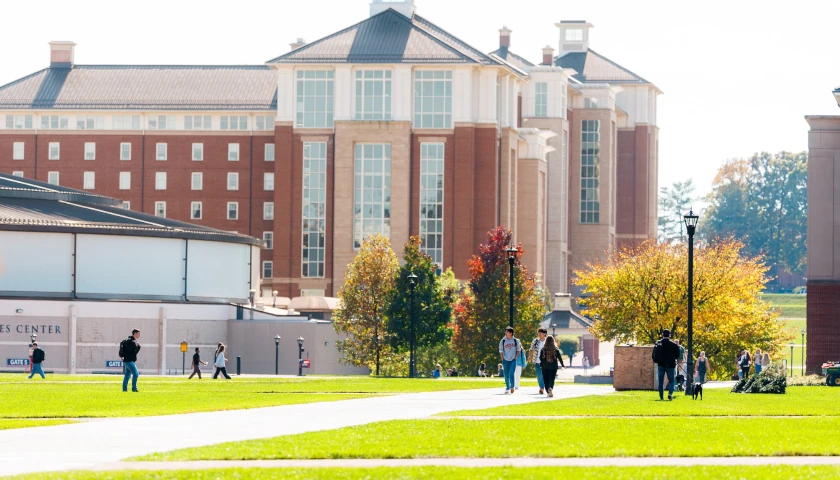by Steve Peoples, Michelle L. Price and Darlene Superville
WASHINGTON, D.C. (AP) — The people closest to President Donald Trump — his family — were starring on the second night of the Republican National Convention as the GOP worked to reintroduce the president to American voters in the midst of the campaign and pandemic.
First lady Melania Trump was delivering Tuesday evening’s keynote address at the White House, while the president’s daughter Tiffany and son Eric were to be featured, too. Trump himself played a significant role throughout the night.
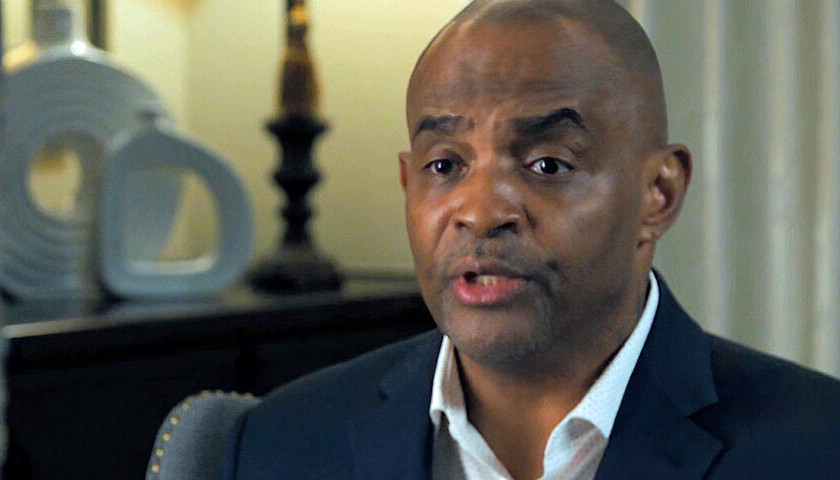
The convention’s planned humanizing focus on Trump’s family was overshadowed at the outset by a controversy that led to one conservative activist being pulled from the program minutes before it began.
The first-term president is laboring to improve his standing in a 2020 presidential race he is currently losing. Most polls report that Democratic rival Joe Biden has a significant advantage in terms of raw support; the former vice president also leads on character issues such as trustworthiness and likability.
On Tuesday night, Trump used the trappings of his office to elevate his message: pardoning a convicted felon, featuring his chief diplomat who was on assignment in Israel, and using the White House Rose Garden for his wife’s keynote address.
With Election Day just 10 weeks off and early voting beginning much sooner, Trump is under increasing pressure to reshape the contours of the campaign. But as he struggles to contain the pandemic and the related economic devastation, Republicans have yet to identify a consistent political message arguing for his reelection.
There was little mention of the pandemic through the first hour of the program, although it remains a dominant issue for voters this fall.
The COVID-19 death toll surged past 178,000 on Tuesday, by far the highest in the world, and there is no sign of slowing. The nation’s unemployment rate still exceeds 10%, which is higher than it ever was during the Great Recession. And more than 100,000 businesses are feared closed forever.
At the same time, the White House seems to have abandoned efforts to negotiate another federal rescue package with Congress.
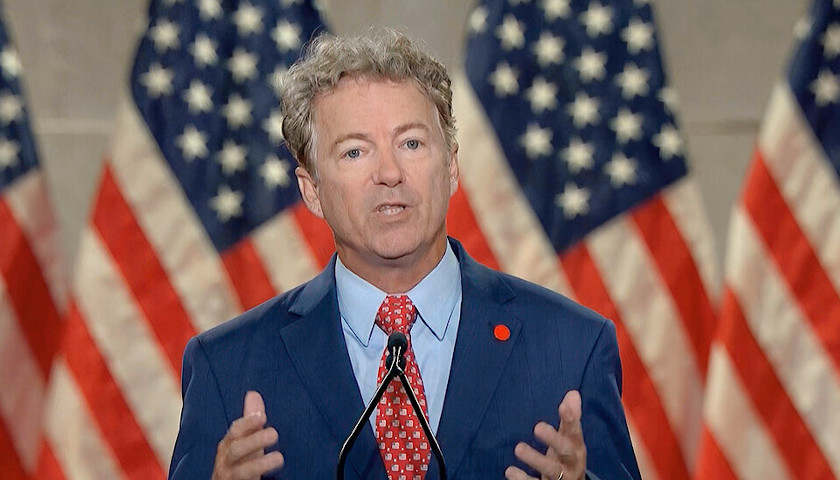
In a show of compassion, before Tuesday’s program began Trump pardoned bank robber Jon Ponder, a Black man who has founded an organization that helps prisoners reintegrate into society.
“We live in a nation of second chances,” Ponder said, standing alongside Trump.
“John’s life is a beautiful testament to the power of redemption,” Trump said before he signed Ponder’s pardon.
Convention organizers had promised an uplifting and hopeful message the night before as the convention began, but that was undermined by dark and ominous warnings from the president and his allies about the country’s future if he should lose in November.
Tuesday’s two-and-a-half-hour program featured an array of elected officials in addition to Trump’s chief diplomat and economic adviser, but in line with Democrats a week earlier the lineup included several everyday Americans.
There was a Maine lobsterman, a Wisconsin farmer, a Native American leader. Social conservatives were represented by an anti-abortion activist and Billy Graham’s granddaughter.
Trump’s party also featured a Kentucky high school student whose interaction last year with Native Americans became a flashpoint in the nation’s culture wars.
Mary Ann Mendoza, an Arizona woman whose son, a police officer, was killed in 2014 in a car accident involving an immigrant in the country illegally, was pulled from the program minutes before the event began. She had directed her Twitter followers to a series of anti-Semitic, conspiratorial messages.
While much of the night was expected to focus on delivering red meat to Trump’s largely white base, the program also offered a look inside the Republicans’ urgent need to expand his coalition.
There were barrier breakers like Kentucky Attorney General Daniel Cameron, the first African American to hold statewide office in Kentucky, and Florida Lt. Gov. Jeanette Nunez, first Latina to hold that office in her state.
And the convention lineup featured a Democrat for the second night: Robert Vlaisavljevich, the mayor of Eveleth, Minnesota, praised Trump’s support for his state’s mining industry in particular.
“President Trump is fighting for all of us. He delivered the best economy in our history and he will do it again,” Vlaisavljevich said.
Secretary of State Mike Pompeo was addressing the convention and nation during an official overseas trip in Israel.
Pompeo’s taped appearance breaks with decades of tradition of secretaries of state avoiding the appearance of involving themselves in domestic politics. That his video was filmed in Jerusalem, where he was on an official foreign trip, has raised additional questions of propriety.
Overall, there were more than a dozen speakers planned for the evening’s prime-time program, most of them appearing in prerecorded video or inside a largely empty Washington auditorium. But there was one intended star.
“Tonight is the first lady’s night,” said campaign spokesman Tim Murtaugh.
Out of the public view for much of the year, Mrs. Trump was stepping into the spotlight to argue for a second term for her husband — while trying to avoid the missteps that marred her introduction to the nation four years ago.
At her 2016 convention speech, she included passages similar to what former first lady Michelle Obama had said in her first convention speech. A speechwriter for the Trump Organization later took the blame.
Only the second foreign-born first lady in U.S. history, Mrs. Trump, 50, is a native of Slovenia, a former communist country in eastern Europe. She became Trump’s third wife in 2005 and gave birth to their now 14-year-old son, Barron, in 2006 — the year she became a naturalized U.S. citizen.
The first lady was to speak from the renovated Rose Garden, despite questions about using the White House for a political convention. She was expected to address an in-person group of around 50 people, including her husband.
Biden and his running mate, California Sen. Kamala Harris, are keeping a relatively low profile this week. In a tweet Monday night, Biden offered a simple message to his supporters: “Just stay focused, folks. Let’s get to work.”
– – –
Steve Peoples, Michelle L. Price and Darlene Superville are reporters for The Associated Press. Peoples reported from New York. Price reported from Las Vegas. AP writers Kevin Freking and Zeke Miller in Washington and Dave Bauder in New York contributed.
About the Headline Photo: President Donald Trump arrives with first lady Melania Trump before signing a proclamation recognizing the 100th anniversary of the ratification of the 19th Amendment, Tuesday, Aug. 18, 2020, in the Blue Room of the White House in Washington. (AP Photo/Patrick Semansky)

